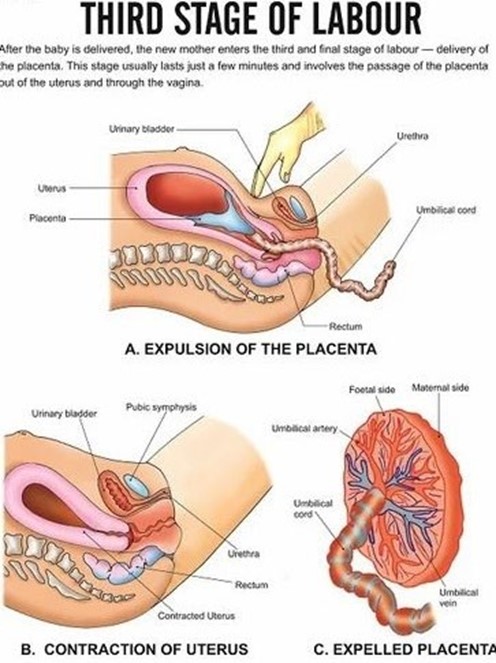A woman has just entered the third stage of labor. The nurse would focus care on which of the following? Select one:
Assisting with the delivery of the placenta and ensuring that the fundus is contracted afterward.
Palpating the woman's fundus for position and firmness.
Encouraging the woman to push with her contractions.
Alleviating perineal discomfort with the application of ice packs.
The Correct Answer is A
Choice A Reason: Assisting with the delivery of the placenta and ensuring that the fundus is contracted afterward. This is an appropriate action for the nurse to perform during the third stage of labor, as it helps complete the process of labor and prevent complications.
Choice B Reason: Palpating the woman's fundus for position and firmness. This is an action that is done after the delivery of the placenta, not during. It is important to monitor the fundal height, location, and consistency to assess uterine involution and bleeding.
Choice C Reason: Encouraging the woman to push with her contractions. This is an action that is done during the second stage of labor, not the third. The second stage of labor is the period from full cervical dilation to the birth of the baby. The nurse's role is to support and coach the woman to push effectively with her contractions.
Choice D Reason: Alleviating perineal discomfort with the application of ice packs. This is an action that is done after the delivery of the placenta, not during. It is a comfort measure that can reduce swelling, pain, and inflammation in the perineal area.

Nursing Test Bank
Naxlex Comprehensive Predictor Exams
Related Questions
Correct Answer is D
Explanation
Choice A Reason: About 1 of every 5 women will experience abuse in her lifetime is a statistic that shows the prevalence of domestic violence, but it does not address the question of what the nurse should emphasize to the group of women.
Choice B Reason: When women go back to the situation after the abuser has calmed down, things will be beter is a false statement that reflects the cycle of abuse, where the abuser may apologize and promise to change after a violent episode, but then repeat the same behavior later. This does not help the women understand their situation or seek help.
Choice C Reason: The victimized woman can easily leave the situation is a false statement that ignores the many barriers and challenges that women face when trying to escape from domestic violence, such as fear, isolation, financial dependence, lack of support, legal issues, and threats from the abuser. This does not empower the women or provide them with realistic options.
Choice D Reason: The violence will not stop or decrease if the woman becomes pregnant is a true statement that highlights the danger of staying in an abusive relationship during pregnancy. Domestic violence can increase the risk of miscarriage, preterm birth, low birth weight, placental abruption, fetal injury, and maternal death. This may motivate the women to seek safety and protection for themselves and their unborn children.
Correct Answer is B
Explanation
Choice A Reason: "If I try to talk to my partner during a contraction, I can't." This is an incorrect answer that indicates a sign of true labor, not false labor. True labor is a condition where there are regular and painful uterine contractions that cause cervical dilation and effacement, and lead to delivery of the baby and placenta. True labor contractions are usually strong and consistent, and they tend to increase or persist with activity or position changes. True labor contractions can be so intense that they interfere with speech or breathing.
Choice B Reason: ) "My contractions slow down when I walk around." This is because this statement by the client would lead the nurse to suspect that the woman is experiencing false labor, which is also known as Braxton Hicks contractions or practice contractions. False labor is a condition where there are irregular and painless uterine contractions that do not cause cervical dilation or effacement. False labor can occur throughout pregnancy, but it becomes more noticeable and frequent in late pregnancy. False labor contractions are usually weak and inconsistent, and they tend to decrease or stop with activity or position changes.
Choice C Reason: "I feel contractions start mostly in my back and they sweep around to the top of my abdomen." This is an incorrect answer that indicates a sign of true labor, not false labor. True labor contractions usually start in the lower back and radiate to the lower abdomen or groin, following a wave-like patern. False labor contractions are more likely to be felt in the upper abdomen or sides, without a clear patern.
Choice D Reason: "My contractions are about 6 minutes apart and regular." This is an incorrect answer that indicates a sign of true labor, not false labor. True labor contractions usually have a regular frequency and duration, and they become closer and longer as labor progresses. False labor contractions are more likely to have an irregular frequency and duration, and they do not change significantly over time.
Whether you are a student looking to ace your exams or a practicing nurse seeking to enhance your expertise , our nursing education contents will empower you with the confidence and competence to make a difference in the lives of patients and become a respected leader in the healthcare field.
Visit Naxlex, invest in your future and unlock endless possibilities with our unparalleled nursing education contents today
Report Wrong Answer on the Current Question
Do you disagree with the answer? If yes, what is your expected answer? Explain.
Kindly be descriptive with the issue you are facing.
